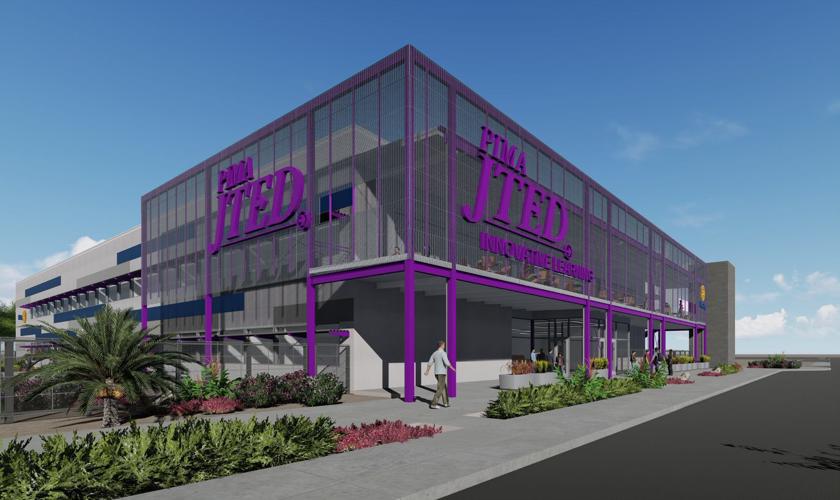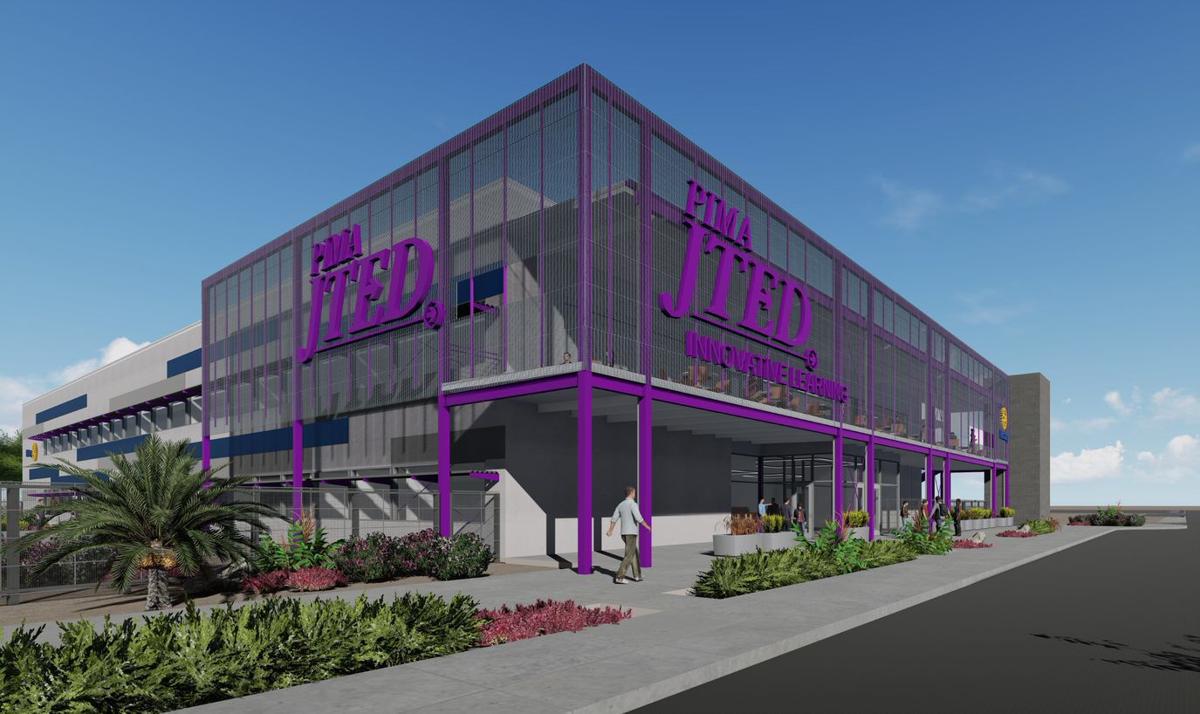A new high school is in the works for Tucson’s south side that would give hundreds of teens the opportunity to work toward industry certifications while earning a high school diploma.
The high school, dubbed the JTED Innovative Learning Campus, will offer industry training in disciplines including culinary arts, medical assisting, mechatronics and more in a 50,000-square-foot “collaborative” learning space. The project is being led by the Pima Joint Technological Education District in partnership with Tucson’s largest school districts.
The campus, planned for the northwest corner of Park Avenue and Interstate 10, will cost the career-and-technical-education district around $14 million to construct and own.
JTED plans on opening the school in the fall of 2020, according to district Superintendent Kathy Prather.
“We’re talking about 14, 15 months from now,” Prather said. “And the reason we're working so quickly ... is because there are so many students that deserve to have this opportunity in their neighborhood, nearby.”

Conceptual image of the new JTED Innovative Learning Campus at the Bridges on Tucson’s south side, near Park Avenue and Interstate 10.
JTED has fifteen independent campuses in the Tucson area, but none of them offer students the opportunity to fulfill general high school graduation credits on site, as this one will. Students going through JTED programs have to bus or drive in after their normal school day to participate.
The formula goes like this: JTED will provide students the industry training programs it has since 2007, and Tucson Unified — Tucson’s largest school district — will provide the general education classes required for earning a high school diploma.
JTED is also looking for ways to get Sunnyside Unified in on the project, Prather said. Though the new school will technically reside in TUSD’s boundary area, it is only minutes away from the neighborhoods Sunnyside serves on the south side of town.
14 YEARS IN THE MAKING
The Innovative Learning Campus has been a project 14 years in the making, according to Prather.
“There has been a discussion of a high school going in at this location … for 14 years,” she said. “Originally, the talk started out with a TUSD bioscience high school. When JTED later formed, the discussion was possibly a JTED school in partnership with other districts. But nothing has happened until now.”
The school will accommodate 400 to 500 students during the day and 450 to 550 at night, Prather added.
Daytime students would be those who choose to attend the school for general education and industry training purposes. Students attending in the evening would be those who come for industry training in addition to the general education they receive at their home high school, which could be a district, charter or private school.
The building opening in 2020 will be the first of three for the Innovative Learning Campus, if all goes as planned . It will offer industry training in:
- Culinary arts.
- Cybersecurity.
- Mechatronics.
- Information technology and web design.
- 3D game design and augmented studio design.
- Medical assisting.
- Licensed nursing.
JTED plans to equip the school with state-of-the-art labs, studios and simulation rooms so students can study and learn their trade in the most realistic scenarios possible, Prather said.
That includes a three-classroom, three-lab “super makerspace STEM area,” where students studying engineering, automation, artificial intelligence and more can gather to collaborate on projects.
“There was a whole lot more we wanted to put into this building, but we didn’t have the space,” Prather said.
“So we really feel we do need to expand in future years to provide additional programs that are in high demand.”
Construction costs for the campus are expected to come in around $9 million, with the land costing “several million” more, said JTED spokesman Greg D’Anna.
JTED will pay off the building and land costs through a lease-purchase to a joint venture between BFL Construction, the builder, and Bourn Cos., the landowner, Prather said. That means the district will pay off the cost of the school over the course of seven or so years — kind of like paying off a mortgage, she added.

Conceptual image of the new JTED Innovative Learning Campus at the Bridges on Tucson’s south side, near Park Avenue and Interstate 10.
The funding for all of this will come from the revenue JTED generates from county property taxes; student enrollment funding, which comes from the state; and a $250,000 grant from the Rotary Club of Tucson, Prather said.
The district plans to secure funding for constructing the other two buildings through public bond elections. If JTED gets the bonds, the campus could end up growing as large as 150,000 square feet.
COLLABORATIVE PARTNERSHIP
TUSD is looking to lease nine classrooms at the new campus. Each of those spaces will be designed to facilitate the project-based curriculum approach the district plans to take, according to Bryant Nodine, the operations program manager at TUSD.
TUSD could end up paying as much as $550,000 per year for the 40,000 square feet it would lease from JTED, according to a letter of intent the TUSD Governing Board approved at its first meeting in March.
The specifics of the partnership are not yet set in stone though, Nodine added. The Governing Board still needs to approve an intergovernmental agreement with JTED before rent or any other costs are solidified.
“There’s work to do, but we feel comfortable that we can create something that works for both of us,” Nodine said.
Sunnyside’s involvement in the project is even less defined, according to district spokesperson Victor Mercado.
The district started seriously talking with JTED about collaboration a couple months ago, Mercado said. So the specifics of any possible collaboration still need to be ironed out.
“They (JTED) are trying to figure out exactly what programs and how that fits,” he said. “Overall, our sense is that we’re pretty excited this is moving forward.”
Since TUSD will be the primary provider of general education services, it could get full state enrollment funding for any student, based on how many academic credits that student takes, Prather and Nodine said.
JTED could generate up to 75 percent of the total enrollment funding possible, per student, depending on how many industry training credits they take.
This project proves public school districts can be collaborative and supportive of one another, despite dwindling student enrollment and funding from the state, Prather said.
“It has been about competition. … Everybody is competing for the kids because that’s how we’re funded,” Prather said. “How can we get beyond that competition and make this work for everybody?”







